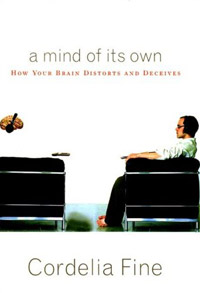This book sounds really cool! I'll have to check it out. |
|
Results 1 to 6 of 6
Thread: The Matrix of the Brain
-
11-21-2007 06:37 PM #1
The Matrix of the Brain
The Matrix of the Brain
a book review by David Ludden
In the 1999 science-fantasy film The Matrix, people have been plugged into a giant computer that creates a virtual reality that is both pleasing and plausible. A few renegade humans have unplugged themselves from the Matrix, only to wake up to a miserable underground existence below a war-scorched Earth. In a similar fashion, our brains generate a comforting version of reality that protects us from the desolation and despair of the real world.
We implicitly trust the products of our brains — our perceptions, our memories, our judgments, our sense of self. We say, “I know what I saw,” and we ask, “How could I forget?” After all, if you cannot trust your own brain, who can you trust? But all is not as it seems. More than half a century of cognitive and social psychology research has shown that much of what we see, remember, and think is an illusion. In her new book A Mind of its Own, Cordelia Fine lays out in a highly entertaining fashion the myriad ways in which our vain, immoral, pig-headed brains are constantly deceiving us.
Although we like to think of ourselves as rational beings, our brains covertly strive to create for us a view of the world and of ourselves that is self serving but not necessarily consistent with reality. Beliefs and opinions are formed quickly and become part of how we define ourselves, so the brain selectively perceives and recalls evidence that supports cherished beliefs while disregarding or forgetting evidence that contradicts our beliefs. Fine calls this “motivated skepticism.” We are naturally skeptical of anything that challenges our beliefs, but accepting of anything that bolsters our beliefs, and hence our egos. For example, it is for us easy to mock the tenets of other religions — “How could they possibly believe that?” — while swallowing whole the equally far-fetched teachings of our own church.

Motivated skepticism can even lead to belief polarization, a process whereby counterevidence only strengthens the convictions of our beliefs. The counterevidence is strenuously scrutinized for any weakness, which is then used to diminish the validity of evidence for our opponent’s point of view. Our selective perceptions are further bolstered by illusory correlations. These are caused largely by selective memory, in which we remember only supporting examples but not counterexamples. For instance, if you already believe the stereotype that all Asians are shy, you will only recall experiences that support this stereotype. When confronted with an assertive Asian, the reaction is likely to be: “Yes, but she grew up in America.” In such a fashion, counterexamples are simply dismissed as aberrations.
Our brains also trick us into believing we have more control over situations than we really do. We blow on dice and perform other rituals to influence events. We also feel safer driving than flying because we think we are in control behind the steering wheel. This is especially true when things turn out in our favor. For instance, we take the credit for picking a winning lottery ticket, but blame a losing ticket on bad luck. It would seem that going through life deluded by our own brains would not be a good thing, but that is not necessarily the case. Some people have markedly more balanced self-perceptions than normal people — they know clearly what their limitations are and how little control they actually have over their lives. They are also clinically depressed, and seeing reality for what it is, they become overwhelmed and lose the desire to go on living. So it seems that our brains delude us to keep us happy, healthy and ready to face life’s challenges. In fact, people who are generally optimistic tend to live longer.
Emotional arousal also plays an important role in cognitive functions. Brain damage can create a mismatch between emotion and rational thought. People who cannot experience arousal during the decision making process, for example, become incapable of making decisions or consistently make poor choices. It seems that the gut feeling we get when faced with a choice is more important than any rational decision-making process.
The experience of emotion is also integral to our sense of self. In a condition known as Capgras syndrome, patients no longer feel any sort of arousal in the presence of family members, and so they become convinced that their loved ones have been replaced by impostors. Others lose the ability to feel emotion altogether; they also feel detached from themselves and lose all interest in life. Even healthy individuals experience this depersonalization sometimes, particularly during traumatic experiences. Afterward, people report a feeling of detachment from the events around them and even from themselves. This seems to be a coping mechanism of the brain to keep it from becoming overwhelmed.
By three quarters of the way through the book, the reader is yearning for a return to blissful ignorance, as there seems to be no escape from what Fine calls “our innate lack of scientific rigor.” But still there is hope. Fine advises that we “[t]reat with the greatest suspicion the proof of [our] own eyes.” In other words, we need to trust in the scientific method to lead us out of the tangle of deceptions our brains weave around us. As with any other behavior, modes of thinking can be practiced until they become automatic, and so Fine is hopeful that practice in critical thinking can help guard us from the extravagances of our own brains.
One of the strongest points of this book is the way Fine deftly describes how research is done in psychology. She does not just tell what is known about how the brain deceives, she explains how we know it. In friendly terms, she presents hypotheses to test, clearly describes how experiments are set up, and shows us how reasonable conclusions are drawn from the data. Thus, she demonstrates how the scientific method can be used to overcome our false beliefs and misconceptions.
Life is pleasant inside the virtual reality of our minds. So what if we think we are more intelligent or virtuous than others and believe we are more in control than we really are? Such minor self-deceptions are, for the most part, harmless, and they may help us to get through the day. But we are not necessarily prisoners of our minds. When the deceptions become harmful to ourselves and others, there is a way out. Science gives us a way to unplug ourselves from the Matrix of our brains.
eSkeptic is the free, electronic companion to Skeptic magazine, published weekly by the Skeptics Society. | Subscribe to eSkeptic by sending an email to [email protected]
~
-
11-21-2007 09:45 PM #2Commie bastard

- Join Date
- May 2007
- Gender

- Location
- USA
- Posts
- 327
- Likes
- 0
While there is a lower class, I am in it.
While there is a criminal element, I am of it.
While there is a soul in prison, I am not free.
-Eugene V. Debs
-
11-30-2007 02:18 AM #3Commie bastard

- Join Date
- May 2007
- Gender

- Location
- USA
- Posts
- 327
- Likes
- 0
I got this at the library, and I am almost done with the first chapter, its really good!
While there is a lower class, I am in it.
While there is a criminal element, I am of it.
While there is a soul in prison, I am not free.
-Eugene V. Debs
-
11-30-2007 06:00 AM #4
-
11-30-2007 07:01 PM #5Commie bastard

- Join Date
- May 2007
- Gender

- Location
- USA
- Posts
- 327
- Likes
- 0
^^
I'm almost done, and its probably one of the best books I have read in a while! Its really fascinating!
There is a chapter about who is in charge of your actions, and studies have found that you prepare to do the action before you even think about doing it. So, and unconscious thought sends a message to the conscious, saying that you want to do something, and then your consiouse mind sends the order.
It also talks about how in one study, they put pictures of coke inbetween every few frames in a Simpsons episode. But, no one noticed it, but they got the inpulse that they want a cook. So, the unconsious mind saw the coke, and decided that you probably want one, and then sends the message to the consious mind without you consiously knowing why!While there is a lower class, I am in it.
While there is a criminal element, I am of it.
While there is a soul in prison, I am not free.
-Eugene V. Debs
-
12-01-2007 08:20 PM #6
Wow this makes me very curious i'll have to check it out this weekend.





 LinkBack URL
LinkBack URL About LinkBacks
About LinkBacks





 Reply With Quote
Reply With Quote


Bookmarks